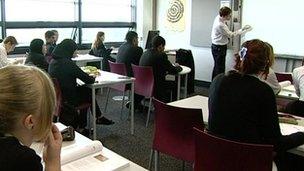Academies told they can hire unqualified teachers
- Published

England's new academy schools can now hire unqualified teachers, after a change to the rules.
Government officials say this means academies will be free to hire "great linguists, computer scientists and other specialists who have not worked in state schools before".
Unions for head teachers and teachers have attacked the move, describing it as a damaging backward step.
The change is immediate.
Until now, most state-funded schools could only employ people with what is known as "Qualified Teacher Status (QTS)", meaning they have been trained and approved as meeting a range of standards.
Independent schools are exempt.
The change also brings academies in line with the new free schools, which are already free to employ people without QTS.
Academies, like free schools, are funded by the state but are semi-independent, outside of local authority control and have greater freedom over the curriculum and teachers' pay and conditions than other schools.
'Dereliction of duty'
The government says it still expects "the vast majority" of teachers to have the qualification, but that the change will allow head teachers to bring in professionals with "great knowledge and new skills".
A spokesman for the Department for Education said: "This policy will free up academies to employ professionals - like scientists, engineers, musicians, university professors, and experienced teachers and heads from overseas and the independent sector - who may be extremely well-qualified and are excellent teachers, but do not have QTS status."
Christine Blower, the general secretary of the National Union of Teachers, said: "This is a perverse decision by the Department for Education and a clear dereliction of duty.
"The NUT believes all children deserve to be taught by qualified teachers.
"Parents and teachers will see this as a cost-cutting measure that will cause irreparable damage to children's education."
The changes will apply to schools switching to become academies. Existing academies will have to apply to make the change by altering their contract (funding agreement) with the government.
About half of England's secondary schools are now either academies or are in the process of becoming academies. Only a small percentage of primary schools have made the change.
Head teachers' leaders have come out against the change too.
The National Association of Head Teachers (NAHT) described it a "significant backward step" which might damage the professionalism of teaching.
And Brian Lightman, the general secretary of the Association of School and College Leaders, said: "Teaching is a skill and the idea of employing individuals who have not been given the tools to do a professional job flies in the face of the coalition government's aspiration of creating a high status profession."
'Inspiring children'
The headmaster of a leading independent school, Brighton College, has supported the changes.
In a statement released through the Department for Education, Richard Cairns said: "I strongly believe that teachers are born not made and I will actively seek out teachers from all walks of life who have the potential to inspire children.
"At Brighton College, we have 39 teachers without formal teaching qualifications, including me," he said,
Some had come straight from top universities, others from careers including law, finance and science, he added.
"Once teachers are in the school, they have a reduced teaching timetable to allow them to spend time observing other good teachers and are actively mentored. By the end of the year, they are, in our view, better trained than any PGCE student."
- Published14 June 2012
- Published13 March 2012